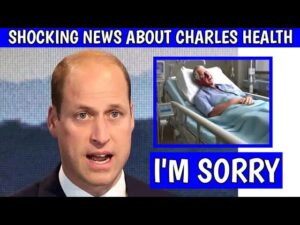King Charles III’s health has become a significant worry for both his close associates and the palace as he grapples with an undisclosed form of cancer.
Reports indicate that the situation is more severe than what has been publicly acknowledged, causing apprehension among those in the monarch’s inner circle.
The future of the British monarchy is now under scrutiny, with a focus on how Charles’s illness could impact the line of succession and the royal family’s privacy.
Sources with insight into the king’s condition have shared that he is resolute in facing his health challenges, with the palace providing unwavering support for his treatment.
Nevertheless, insiders hint that the gravity of the situation surpasses what is known to the public.
Notably, Tom Sykes of The Daily Beast reported that while optimism prevails, concerns persist about the seriousness of Charles’s health.
Renowned royal writer Tina Brown has also added her perspective to the discussion, revealing that Prince William and Kate Middleton are deeply troubled by the potential consequences of Charles’s illness.
Brown emphasized the couple’s desire for a period of privacy to nurture their children before assuming the throne.
However, with Charles’s health deteriorating, their succession might be accelerated, thrusting them into the limelight sooner than anticipated and impacting their ability to shield their children from public scrutiny.
The significance of the situation is further highlighted by the ongoing review of Charles’s funeral arrangements, known as Operation Menai Bridge.
While it is customary for royal funeral plans to be regularly updated, the current review’s urgency and thoroughness suggest a heightened state of readiness.
Sources indicate that the circulation of these plans has intensified in light of Charles’s health, indicating the palace’s proactive approach.
In February, Buckingham Palace officially confirmed the king’s cancer diagnosis, disclosing that the 75-year-old had undergone surgery for a benign prostate enlargement, leading to the discovery of the cancer.
Subsequently, doctors advised him to scale back on public duties and focus on his treatment.
This announcement stirred national concern, with the monarch’s health becoming a topic of public interest.
Following his surgery, Charles expressed gratitude for the overwhelming support and well-wishes from the public.
Two months later, he made a public appearance at Easter services alongside Queen Camilla.
His presence at public events amidst health challenges symbolized resilience and determination.
However, uncertainties surrounding Charles’s health raise questions about the monarchy’s future.
If Charles were to pass away, Prince William would be next in line for the throne.
The possibility of an accelerated transition has sparked anxiety within the royal family, particularly for William and Kate, who had envisioned more time to raise their children away from public scrutiny.
The premature shift adds pressure to their already demanding roles.
The implications of Charles’s illness extend beyond succession concerns, prompting reflections on the monarchy’s capacity to navigate uncertainty and maintain public support.
With a history of overcoming challenges, the royal family faces another test of resilience amid Charles’s health struggles.
As the palace closely monitors his condition and revises funeral plans, the nation observes with anticipation.
The outcome of Charles’s battle against cancer will undoubtedly shape the monarchy’s future and impact the royal family.
Amidst continuous support and well-wishes from the public, the enduring fascination and affection towards the British royals remain evident.
As updates on Charles’s health are awaited, the monarchy’s ability to adapt and endure through turbulent times is once again put to the test.
